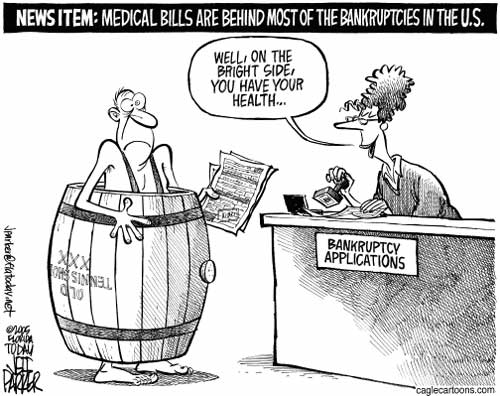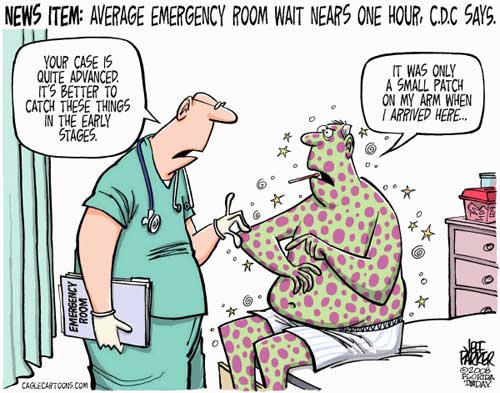 By DAN K. THOMASSON Scripps Howard News Service March 09, 2009
Obviously, there are no simple answers. Some experts blame the high cost of new technology, others charge the insurance companies and still more blame the doctors and more specifically the hospitals and the pharmaceutical manufacturers and the consumers themselves. The government (namely Congress) has played a major role. Actually, all must share the responsibility for a system that seems utterly immune to meaningful cost control let alone reduction. It is an enormously complex problem.  Jeff Parker, Florida Today Distributed to subscribers for publication by Cagle Cartoons, Inc.
Whatever the solution, one need only experience the bureaucratic horror of a medical emergency to understand at least a small part of the reason for the runaway growth of expenses. In this case a persistent splitting headache resulted in 14 hours of needless redundancy with a price tag attached to every one. Hospitals have turned the old Army "hurry up and wait" culture into an art form which some cost accountant with a green eyeshade breaks down and allocates to a fare-thee-well, ready to pass on the resulting costs to an insurance company. The nightmare began at 2 p.m. when a CT scan revealed a growth in the skull that was causing a fluid build-up. The symptom was a debilitating headache, dizziness and nausea. About 18 hours later the patient finally was admitted to a permanent room to await further tests and a biopsy. Throughout much of the time, the pain was so excruciating that even a powerful narcotic could alleviate it only partially.  Jeff Parker, Florida Today Distributed to subscribers for publication by Cagle Cartoons, Inc.
When the summoned neurosurgeon finally made it three hours after treating an emergency elsewhere, he apologized for his delay and promised to get her settled and some relief quickly. Because of the location of the hospital, he decided to send her to another that was closer to her house and those of her support group -- parents, etc. He promised to clear the way but when she arrived at the second hospital, rather than a "direct admit," she was told she would have to go through that facility's ER and be re-evaluated. That, of course, meant more of the same questions and manual tests. Finally a strongly worded telephone call at 3 a. m. to her primary physician resulted in a speeding up of the process. In the meantime she waited first in a chair, then on a gurney in the hallway and then in another room in the ER for more than an hour. By 4 a. m., three quarters of day after her agony began she was in a permanent room. The cost of this hasn't been determined. But there is certain to be a charge for each step. The needless repetition and bureaucratic bumbling, despite triage designed to get quick help for the most urgent cases, is not only expensive it is probably endemic to any system, especially one run by the notoriously inefficient government. Check out Canada if you question that. Meanwhile, all one can really say is good luck, Obama, in finding an antidote no one else has discovered.
Howard News Service, at thomassondan(at)aol.com Distributed to subscribers for publication by Scripps Howard News Service, http://www.scrippsnews.com
|
||